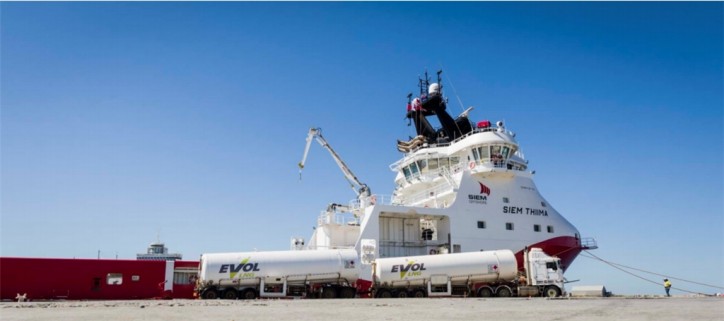- First Australian commercial LNG bunkering completed in WA’s north‐west on 23 January 2017 by EVOL LNG for Woodside
- First LNG bunkering at Fremantle Port completed on 19 February 2017
- LNG is a cleaner alternative to marine diesel, emitting 25 per cent less carbon dioxide and leaving no residue in the unlikely event of a spill.
Western Australia is leading the nation in providing access to a cleaner shipping fuel for marine vessels, with the first commercial bunkering operation undertaken by Wesfarmers’ EVOL LNG in the state’s north‐west.

Under an agreement with Woodside, EVOL LNG successfully refuelled the platform supply vessel, Siem Thiima, on 23 January at King Bay Supply Base near Dampier. Business Manager, Nick Rea sees it as just the beginning.
“Our decision to enter the LNG bunkering market is part of a long‐term strategy that recognises environmental and economic sustainability of LNG as a transport fuel,” said Mr Rea.
“It also recognises that the LNG marine fuel market is still in development so the fact EVOL has over 15 years’ experience in distributing LNG means we saw an opportunity to provide a suite of services that perhaps others can’t.
“EVOL can safely manage the bunkering process plus provide key services such as training in safe handling of LNG, enabling our customers to confidently adopt LNG as a marine fuel.
“With growing demand for lower emission fuels over the past decade, we’ve seen the number of LNG‐ fuelled ships in operation worldwide increase steadily from a handful to more than 75, with an additional 80 expected to be built in the next three years.”
Mr Rea said that growth had largely been driven by International Maritime Organisation (IMO) regulations and the introduction of emission control areas in Europe and North America. In addition, China has introduced emission control areas around its three major ports.
“Interest in LNG as a marine fuel is growing, especially since the IMO announced that it would introduce a global marine fuel sulphur limit of 0.5 per cent from 2020,” he said.
“LNG is a cleaner fuel than marine diesel, emitting 25 per cent less carbon dioxide, less nitrogen oxides and almost zero sulphur oxides and particulates, which largely addresses emission concerns for the shipping industry and avoids expensive and complicated scrubbing systems(1) .”
Mr Rea said that as emission reduction efforts continued to become more important globally, including in Australia, the adoption of LNG as a low emission marine fuel was expected to increase accordingly.
“It’s certainly an offering we’d like to expand, particularly as truck‐to‐ship LNG bunkering can be achieved relatively inexpensively with existing logistics assets.”
“If interest is there, EVOL LNG will obtain licences from other major Australian and regional WA ports to conduct LNG bunkering operations, and look at investing in infrastructure to meet the market’s needs.”
Mr Rea said EVOL LNG would be able to supply Fremantle customers with LNG at a price competitive with low‐sulphur marine diesel and would be able to refuel ships at up to 45 tonnes per hour, which is comparable to traditional bunker fuels.
EVOL LNG secured its second major Australian port bunkering licence from Pilbara Ports Authority, permitting LNG bunkering at King Bay Supply Base and transport through the Port of Dampier. This followed its first licence from Fremantle Ports in July last year.
Fact file
- Bunkering is the practice and business of refuelling ships.
- EVOL LNG designed and fabricated a bunkering system for Woodside that is fully compliant with the comprehensive international LNG bunkering standard, ISO 18683:2015.
- Since 2001 EVOL LNG has been an industry leader in the safe handling of LNG in the Australian power generation, industrial and transportation markets.
- Initially LNG will be delivered from EVOL LNG’s Kwinana plant.
- King Bay Supply Base near Dampier is 1320 kilometres from Kwinana.
- Siem Thiima is owned by Norwegian company Siem Offshore Australia Pty Ltd and is the first LNG‐fuelled platform supply vessel in Australia.
- LNG vaporises and leaves no residue in the event of a spill, minimising adverse impact on marine life or waterways. LNG is a cleaner alternative to marine diesel, emitting 25 per cent less carbon dioxide, less NOx and almost zero SOx.
- Fremantle Ports and Port of Dampier join the growing global LNG bunkering network which includes major ports in Europe, North America, Qatar, Singapore, Japan and Korea as well as more than 40 other ports around the world which currently, or plan to, bunker LNG.
(1) - To remove SOx from high sulphur marine fuel exhaust, a scrubber can be fitted. It sprays seawater into the exhaust to remove the SOx and particulates. The ship then has to dispose of the particulate sludge.
Source: EVOL LNG